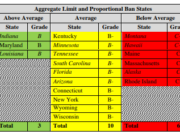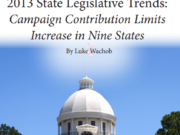In this case study, Mike Schrimpf examines the effect of newly installed campaign contribution limits in Philadelphia’s 2007 mayoral race.
Some Philadelphians blame once-apparent savior Tom Knox for the failure of contribution limits. It turns out that Knox was a millionaire businessman with an arguably questionable past, willing to spend much of his personal fortune to become mayor. The real culprit, of course, is the understandable desire of Philadelphians to speak out in political campaigns, to share their opinions and inform their fellow citizens about what they see as a candidate’s Good, Bad, and Ugly.
Concerned about Knox’s campaign and what they viewed as his evasion of campaign finance limits they wholeheartedly supported…the Philadelphia Daily News suggested in an Editorial that, “Maybe a swift boat 527 torpedo between the stacks, painting Knox as an interest-rate-gouging payday lender and an insider whose businesses have benefited from connections” was needed to inform voters.
A few days later The Daily News got its wish. A pair of independent advocacy organizations, or 527’s, were formed: “Working People for Truth” and the “Economic Justice Coalition for Truth.” The Daily News recognized that “voters are getting more help in sizing up Knox right now” thanks to the 527 groups.
Eventually, Michael Nutter won the Democratic primary with 36 percent of the vote, besting Knox by 11 points. What made the difference?
According to The Inquirer, “Enough voters figured out the difference between TV Tom, the ethical crusader Knox pretended to be, and the cold schemer his business record showed him to be.” Undoubtedly, the 527 organizations were instrumental in helping shape this impression of Knox.
As seen in Philadelphia’s 2007 mayoral race, the consequences of contribution limits and other restrictions on political speech are millionaire candidates, campaigns dominated by independent organizations instead of candidates, and a system that favors political insiders who have the resources and knowledge to suppress dissenting voices by litigating to prevent political speech. Rather than seeking to further restrict political rights, Philadelphia should return to its roots by standing for freedom and liberty in campaign finance.
Read the full Case Study here.














